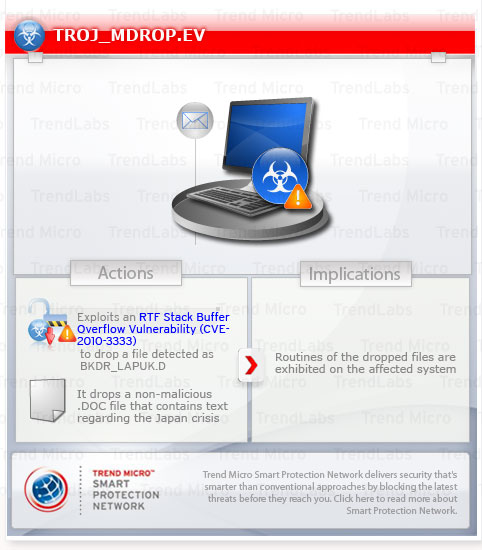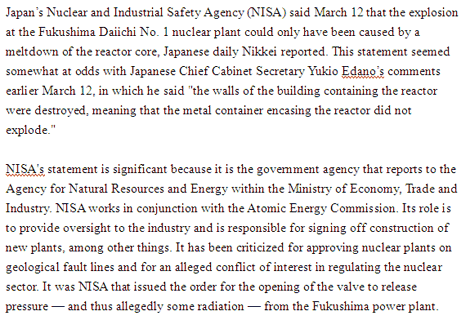TROJ_MDROP.EV
Trojan.Mdropper (Symantec); Exploit.MSWord.CVE-2010-3333.b (Kaspersky)
Windows 2000, Windows XP, Windows Server 2003


Threat Type: Trojan
Destructiveness: No
Encrypted: No
In the wild: Yes
OVERVIEW
This Trojan exploit targets a known vulnerability in <i>Microsoft Office Word</i> with the way it handles specially crafted .RTF document files. In addition, it also uses social engineering techniques. Specifically, it drops a non-malicious document file containing information about the recent crisis in Japan. With this, it lures users into thinking that they are viewing a normal file while this Trojan runs in the background.
To get a one-glance comprehensive view of the behavior of this Trojan, refer to the Threat Diagram shown below.

Once this Trojan successfully exploits the vulnerability, it then drops and execute the malicious file detected as BKDR_LAPUK.D.
This Trojan arrives as an attachment to email messages spammed by other malware/grayware or malicious users.
It executes the dropped file(s). As a result, malicious routines of the dropped files are exhibited on the affected system.
TECHNICAL DETAILS
Arrival Details
This Trojan arrives as an attachment to email messages spammed by other malware/grayware or malicious users.
Installation
This Trojan drops the following non-malicious files:
- C:\word.doc
Dropping Routine
This Trojan takes advantage of the following software vulnerabilities to drop malicious files:
- Microsoft Security Bulletin MS10-087
It executes the dropped file(s). As a result, malicious routines of the dropped files are exhibited on the affected system.
NOTES:
Other Details
Once this Trojan successfully exploits the said vulnerability, it attempts to drop and execute the following malicious file:
- %User Temp%\WINWORD.EXE - detected as BKDR_LAPUK.D
However, due to errors in its code, it fails to perform this intended routine.
The said .DOC file contains the following text:

This Trojan opens the normal .DOC file to hide its execution routine.
SOLUTION
Step 1
For Windows XP and Windows Server 2003 users, before doing any scans, please make sure you disable System Restore to allow full scanning of your computer.
Step 3
Scan your computer with your Trend Micro product to delete files detected as TROJ_MDROP.EV. If the detected files have already been cleaned, deleted, or quarantined by your Trend Micro product, no further step is required. You may opt to simply delete the quarantined files. Please check this Knowledge Base page for more information.
Step 4
Download and apply these security patches Refrain from using these products until the appropriate patches have been installed. Trend Micro advises users to download critical patches upon release by vendors.
Did this description help? Tell us how we did.


